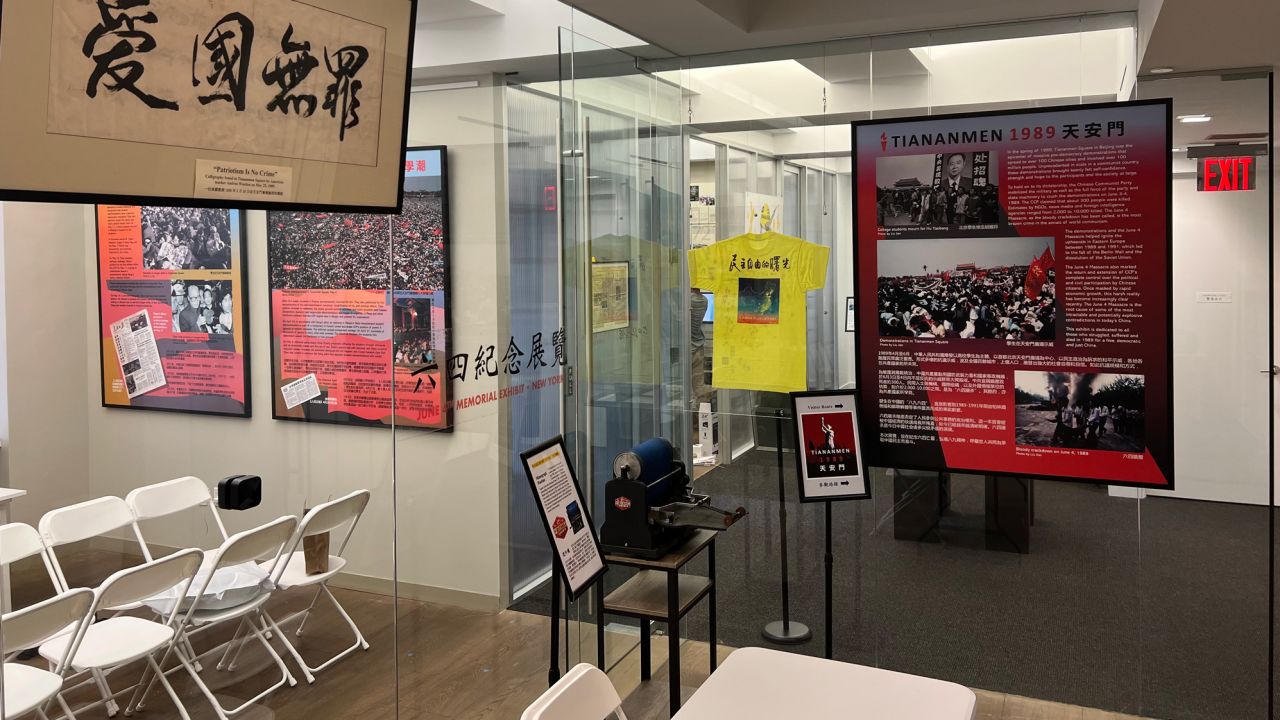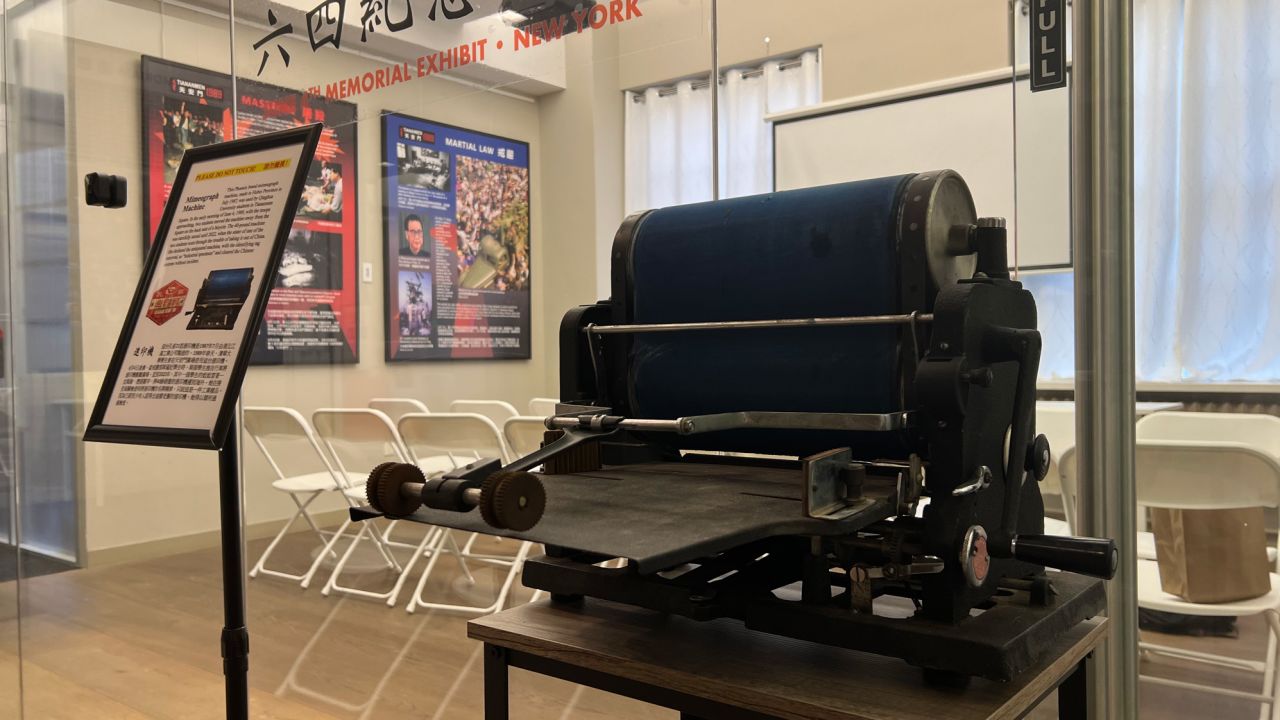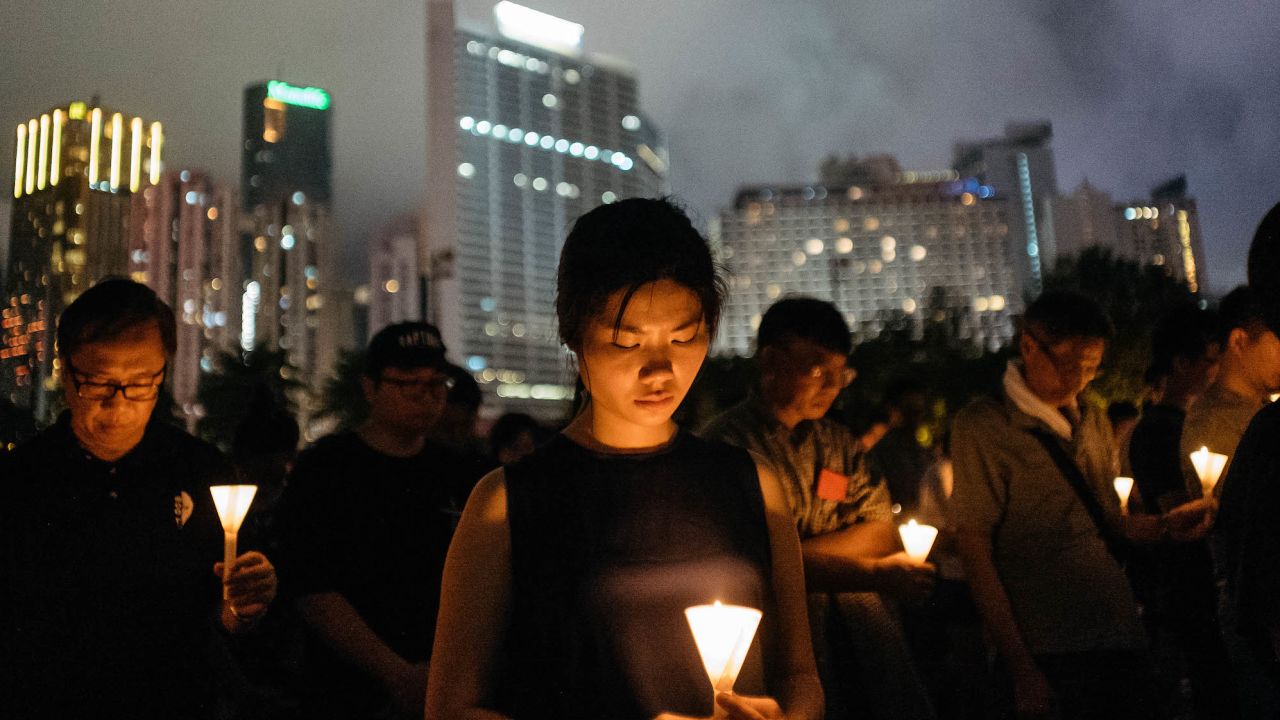Tiananmen Square masacre anniversary: vigils go global as authorities in China and Hong Kong stamp out remembrance
Hong Kong
CNN
—
Hong Kongers living overseas are helping to keep the flame of remembrance alive for the victims of China’s Tiananmen massacre as authorities in a city that once hosted huge annual vigils continue to stamp out dissent.
Until recently Hong Kong was the only place within China where large-scale gatherings each June 4 were tolerated to remember the moment in 1989 when the Communist Party sent tanks in to violently quell peaceful student-led democracy protests in Beijing’s Tiananmen Square.
But the annual candlelight vigils have been silenced the last three years in the wake of pandemic restrictions and Beijing’s ongoing political crackdown in Hong Kong, which was upended by its own huge democracy protests in 2019.
This year will be no exception. It is therefore overseas that the 34th Anniversary was commemorated in the most concerted way.
Protests and vigils are being planned in many cities across the globe, including Australia, Japan and Taiwan, Europe, United States, Canada and Europe. This is due to the growing number of Hong Kongers moving overseas.
“I think it’s sad to say that what Beijing and Hong Kong are doing is trying to erase history and the memory,” said Kevin Yam, a former lawyer in Hong Kong, who will be attending a ceremony in Melbourne, Australia, where he now resides.
“For those who can still remember, we have the obligation to let the world know that we have not forgotten,” he told CNN.

New York’s Museum of Tiananmen is a great example of Tiananmen’s globalization.
Zhou Fengsuo, and Wang Dan, former student leaders from 1989 who now reside in the United States and took part in Tiananmen’s protests, unveiled on Friday a memorial exhibit for the 4th of June at 6th Avenue.
Display includes items from survivors of the massacre, including newspapers that chronicled the events, a shirt stained with blood from a former reporter and an old printer used by protesters which was smuggled out of China.
Zhou said the idea to create a New York exhibition began five years ago but the closure of Hong Kong’s own June 4 museum by authorities in 2021 “added to the urgency”.
“Hong Kong has been carrying the torch for commemorating the Tiananmen massacre, keeping the legacy alive. When the museum was shut down, with the Hong Kong alliance’s leaders in prison, we knew it was a critical moment,” he said.
“We have to continue here in the United States.”
The 2,200-square-feet venue in New York can host up to 100 guests at a time, with schools and universities already reaching to request for a tour, Zhou said, adding they have raised enough funding to keep it running for “many years”.

Thirty four years ago, Beijing sent in People’s Liberation Army troops armed with rifles and accompanied by tanks to forcibly clear the square where students were protesting for greater democracy.
There is no official death toll, but there are estimates that range from hundreds to thousands of deaths, and many more injuries.
Authorities in mainland China are doing everything they can to erase the memory of Tiananmen. They have censored news reports and removed all references from the Internet. They have arrested and chased into exile those protesters who organized the demonstrations. And they keep the relatives of the victims under constant surveillance.
The censorship of the June 4 events has led to generations of Chinese mainlanders growing up unaware of them.
Hong Kong is different.

Somber and defiant vigils were an annual political cornerstone, first under colonial British rule and then after the city’s 1997 handover to China. Tens of thousands would descend every June 4 in the rain or shine to Victoria Park, with speakers calling for accountability from the Chinese Communist Party.
But Hong Kong’s political culture has changed drastically in the aftermath in 2019’s huge and sometimes violent democracy protests.
Beijing responded by passing a national security law which outlawed the majority of dissent. Leading democracy activists, including key Tiananmen vigil figures, have been jailed, critical newspapers shuttered and the political system overhauled to ensure only “patriots” are allowed.
Authorities banned the vigil in 2020 and 2021 citing coronavirus health restrictions – though many Hongkongers believe that was just an excuse to clamp down on shows of public dissent.
Last year, the park remained in darkness again, barricaded off on all sides with police stopping and searching passersby to “prevent any unauthorized assemblies which affect public safety and public order, and to prevent the risk of virus transmission due to such gatherings,” according to a government statement.
Hong Kong Alliance (the group that organized past vigils) has been disbanded. Three of its leaders are in prison on national security charges.
In the run up to this Sunday’s anniversary, authorities made clear commemorating Tiananmen this year would not be tolerated.
Security secretary Chris Tang – a former police chief – said he expected some might use “this very special day” to advocate Hong Kong independence and subvert state power, acts banned by the new national security law.
“But I want to tell these people that if you carry out these acts, we will definitely take decisive action,” he warned, adding: “You will not be lucky.”
Hong Kong police maintained a heavy police presence around the park on the anniversary’s eve, deploying multiple police coaches and even an armored vehicle at one point.
On Saturday night, a few artists and activists ignored warnings by turning up at the park to create private commemorations using floral tributes or banners. They were quickly arrested and taken away.
As of Saturday, a police spokesperson said that four people had been arrested for disorderly conduct in public and acts committed with seditious intention. Police said some individuals had protest props bearing allegedly “seditious” wording. Police said that four others were also brought in to be investigated further.
Richard Tsoi said that he would commemorate this event at home or in a private place.
“Definitely there will be not be large-scale commemoration activities. Whether one can mourn in public without breaking the law is also a question,” said the ex-organizer, who used attend every vigil in the past.
Throughout Hong Kong physical reminders of the Tiananmen massacre, including a famous “Pillar of Shame” statue that used to stand in the city’s oldest university, have been dismantled in recent years.
Yet last month a replica of the “Pillar of Shame” was erected in Berlin, with the help of its original Danish artist Jens Galschiot and a prominent Hong Kong activist now living in Germany. The artist provided over 40 giant banners with the image of the pillar for 18 cities to commemorate their events. This included Los Angeles and Boston.
Last year, another pillar of the Norwegian pillar system was unveiled.
“It is true that the commemorations around June 4th have expanded and become more global since it has become impossible to do anything in Hong Kong,” he told CNN.
Zhou believes Hong Kongers are key in preserving Tiananmen memory overseas.
“Since last year, many places have seen record numbers in attendance largely because of Hong Kong immigrants,” he said.
Many Hong Kongers have left for overseas with the city’s population dropping from 7.41 million to 7.29 million last year.
In Britain – where more than 100,000 Hongkongers have since settled after London offered an easier pathway to citizenship two years ago – about a dozen marches and vigils are slated to take place throughout June 4 across the country, from Nottingham and Manchester, a popular destination for Hong Kong immigrants.
In London, the marchers will gather in Trafalgar Square, before marching on to the Chinese embassies where a vigil is being held.


